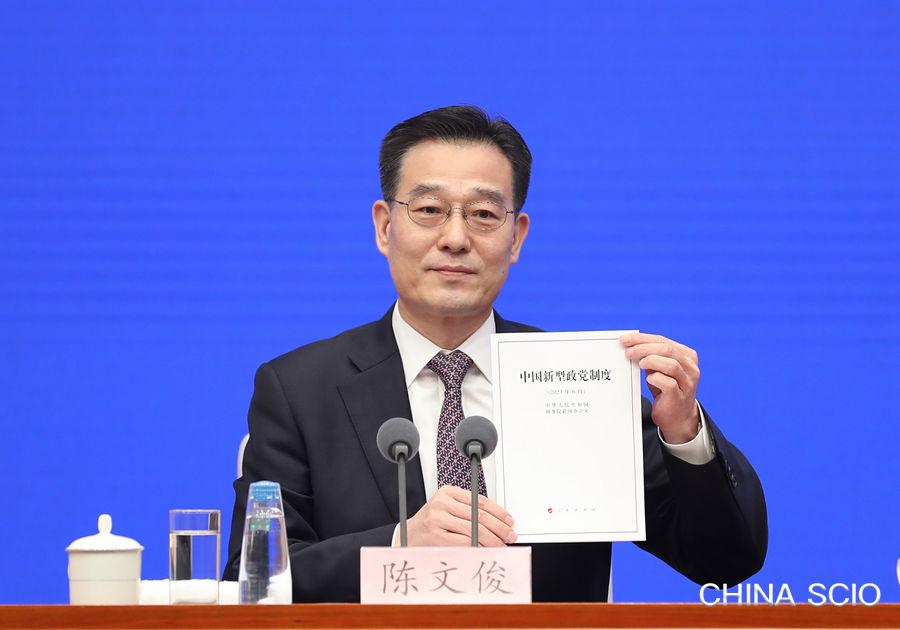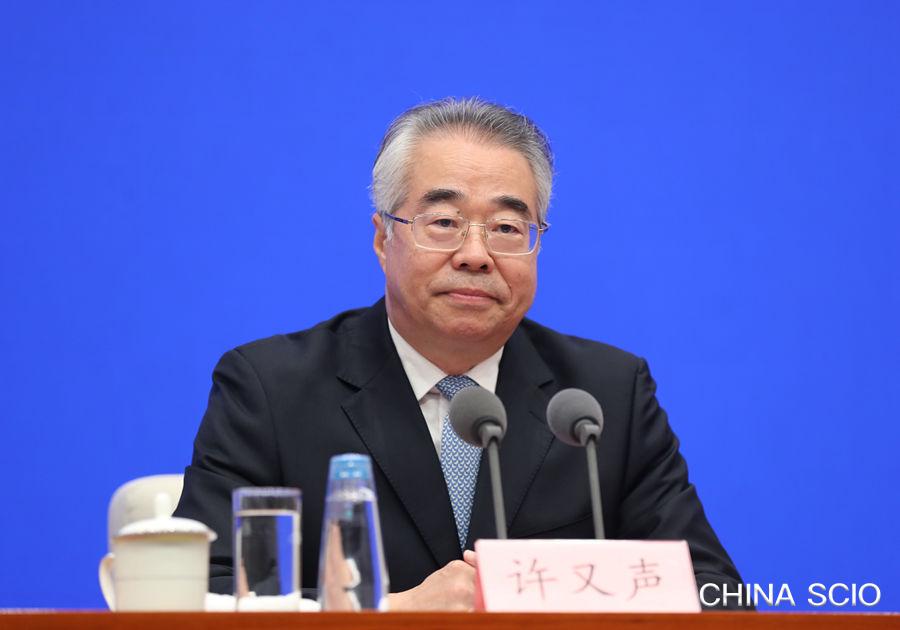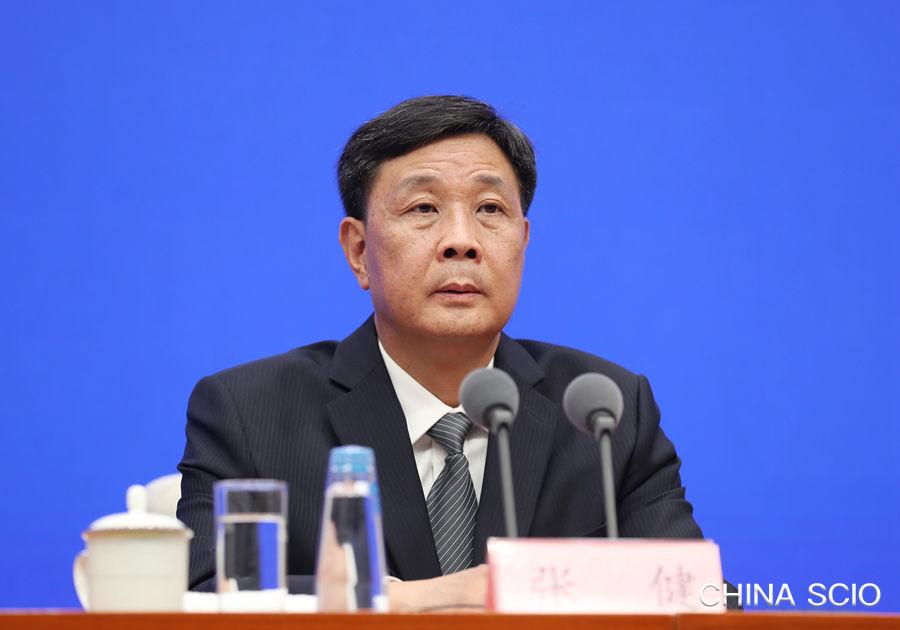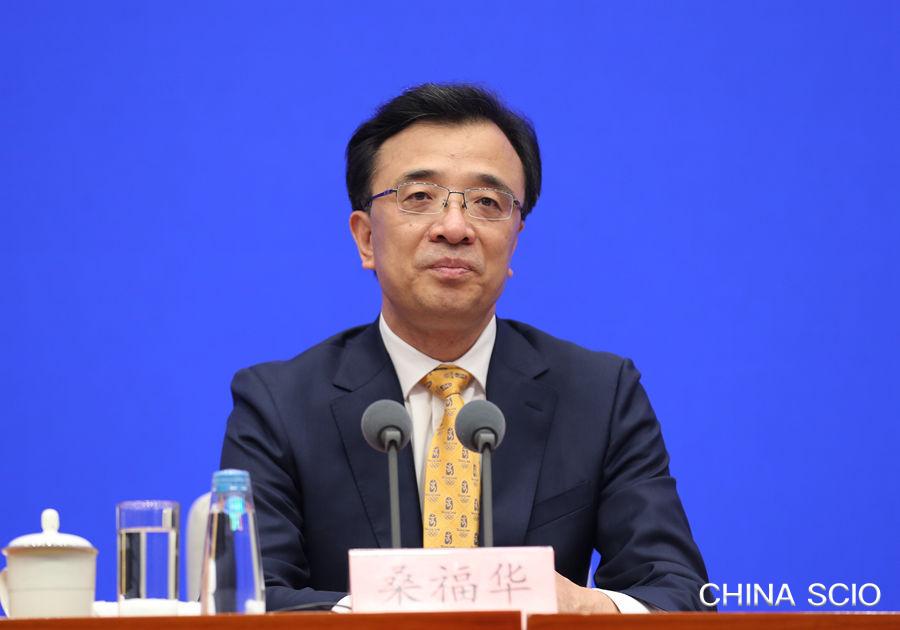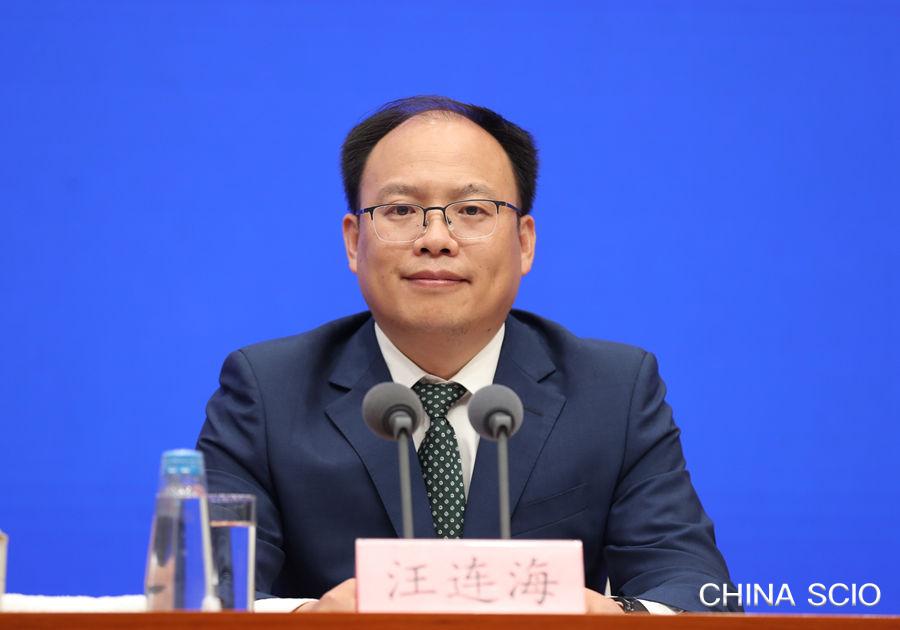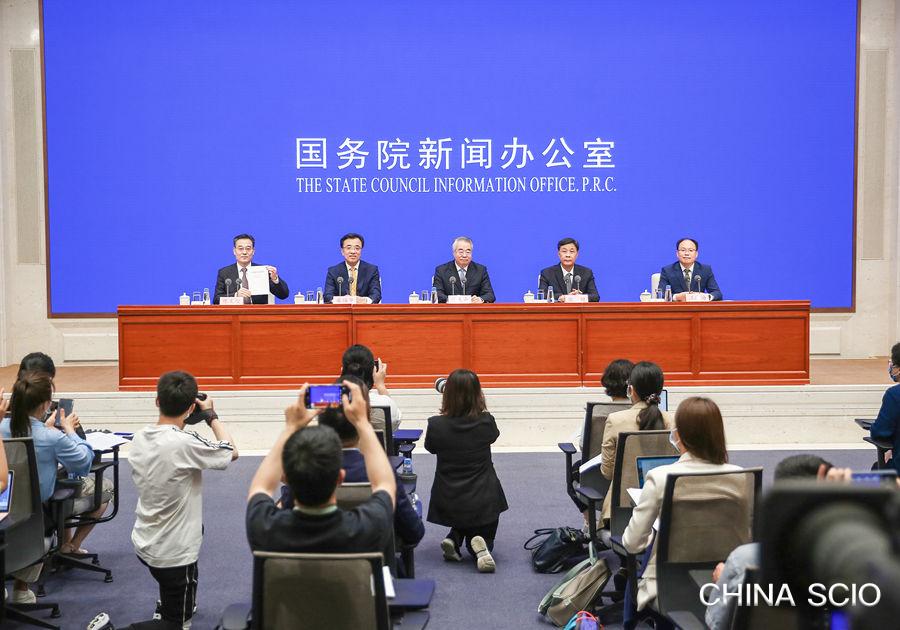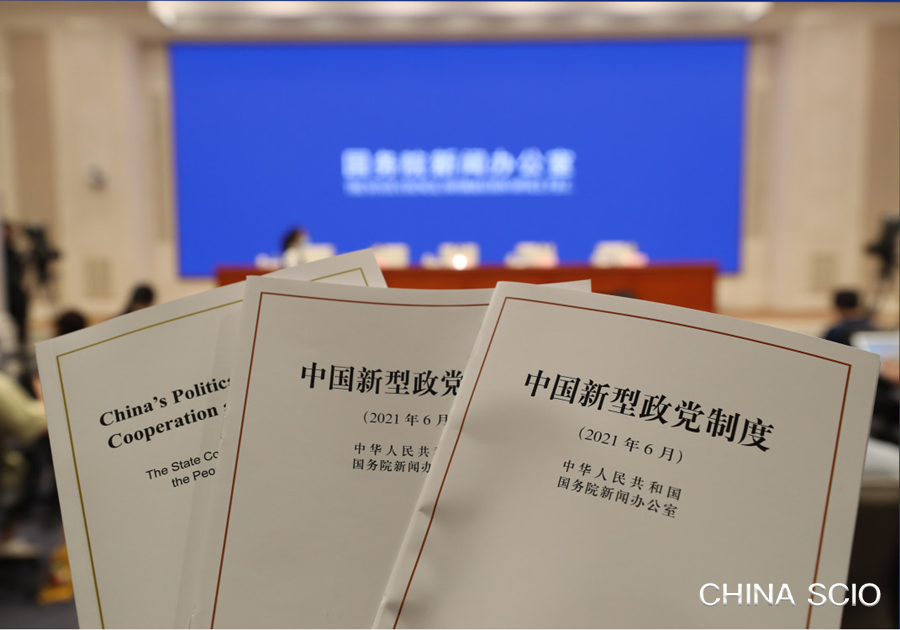.
Read in Chinese
Speakers:
Xu Yousheng, deputy head and spokesperson of the United Front Work Department of the Communist Party of China (CPC) Central Committee
Zhang Jian, director of the Research Office of the United Front Work Department of the CPC Central Committee and spokesperson of the United Front Work Department of the CPC Central Committee
Sang Fuhua, head of the Bureau of Non-CPC Political Parties Work of the United Front Work Department of the CPC Central Committee
Wang Lianhai, head of the Theory Bureau of the Research Office of the General Office of the National Committee of the Chinese People's Political Consultative Conference
Chairperson:
Chen Wenjun, head of the Press Bureau of the State Council Information Office (SCIO) and spokesperson of the SCIO
Date:
June 25, 2021
Chen Wenjun:
Ladies and gentlemen, good morning. Welcome to this briefing held by the State Council Information Office (SCIO). As the Communist Party of China (CPC) celebrates its centenary, the SCIO issued a white paper today titled "China's Political Party System: Cooperation and Consultation." The white paper reviews the creation, development and constant improvement of China's political party system, elaborates on its distinctive characteristics, and shares China's achievements and experience in developing the system over the years, particularly since the 18th CPC National Congress in 2012. Based on a previous white paper titled "China's Political Party System" issued by the SCIO in 2007, the new one demonstrates new progress in multiparty cooperation in the new era and provides a comprehensive picture of China's political party system.
The white paper, which extends to around 14,000 Chinese characters, consists of a preamble, the main body of text, and a conclusion. The main body is divided into nine parts: China's Political Parties, A Unique Political Creation, Close Cooperation Between Political Parties, China's Political Party System Has Distinctive Characteristics and Strengths, the CPC Consults with Other Political Parties and Non-Affiliates, the CPC Supports Other Political Parties and Non-Affiliates in Conducting Democratic Oversight, the CPC Cooperates with Other Political Parties and Non-Affiliates in Governing the Country, Non-CPC Political Parties and Non-Affiliates Provide Advice on Economic and Social Development, and the CPPCC Is an Important Political and Organizational Platform in China's Political Party System.
The white paper is published in eight languages – Chinese, English, French, Russian, German, Spanish, Arabic and Japanese, by the People's Publishing House and the Foreign Languages Press. It is available at Xinhua Bookstore outlets across the country.
In order to help you gain an accurate and deep understanding of the white paper, we are holding this press conference. We have invited Mr. Xu Yousheng, vice minister and spokesperson of the United Front Work Department of the CPC Central Committee; Mr. Zhang Jian, director of the Research Office of the United Front Work Department of the CPC Central Committee and spokesperson of the department; Mr. Sang Fuhua, head of the Bureau of Non-CPC Political Parties Work of the United Front Work Department of the CPC Central Committee; and Mr. Wang Lianhai, head of the Theory Bureau of the Research Office of the General Office of the National Committee of the Chinese People's Political Consultative Conference.
Xu Yousheng:
Ladies and gentlemen, good morning. In a few days, we will celebrate the 100th anniversary of the founding of the CPC. During its century of exploration and struggle, the CPC has succeeded in applying the basic principles of Marxism to the Chinese context, rallied all the forces that could be united into a united front, and developed China's political party system, which is a system of multiparty cooperation and political consultation under the leadership of the CPC. This system has demonstrated its unique advantages and strong vitality in both the political and social life of our country.
Since the 18th CPC National Congress, the CPC Central Committee with Comrade Xi Jinping at its core, with the aim of developing socialist democracy and realizing the Two Centenary Goals and the Chinese Dream of national rejuvenation, has laid out a series of new ideas, new thinking, and new strategies for developing and improving China's political party system. It has also made a series of major policy decisions and plans to ensure standardized consultation between political parties, strengthened participation and deliberation in the administration of state affairs, and improved democratic oversight. By doing this, it has given full play to the important role of China's political party system in helping modernize China's system and capacity for governance.
China's political party system is rooted in the best of Chinese traditions and began during the democratic revolution. The system took shape during political consultations in preparation for the founding of the PRC and has developed in the course of socialist revolution, economic development, and reform. It is improving in the new era of Chinese socialism. The system is a unique political structure created by the CPC, the Chinese people, the non-CPC political parties, and non-affiliates. According to the white paper, China's political party system sprouted from Chinese soil and evolved over time based on China's historical heritage, cultural traditions, and economic and social development.
Under the system of socialism with Chinese characteristics, the essence of people's democracy is that problems should be solved through consultation, and anything that concerns the public should be discussed by the public, through which the people are able to build the broadest possible consensus that reflects the aspirations and expectations of the entire society. The white paper has stressed that based on cooperation, participation and consultation, and by following the principle of unity, democracy and harmony, China's political party system plays an important role in encouraging the people to participate in politics, voice their views, and achieve social integration, democratic oversight and sustained stability. The system embodies the interests of the widest range of social groups, reflects the shared goals of all, promotes sound decision-making and implementation, and ensures effective state governance. It is a major institutional channel for socialist consultative democracy through which the people's position as masters of the country is ensured.
While striving for the goals of achieving national independence, the people's liberation and wellbeing, and the prosperity of the country, the CPC has worked together and shared a common destiny with the non-CPC political parties, forming a new type of relationship featuring cooperation, unity and harmony. In this system, the CPC represents the leadership of socialism with Chinese characteristics, which was confirmed and consolidated in the course of China's revolution, economic development, and reform. It is the choice of history and of the people. The non-CPC political parties accept the leadership of the CPC. They carry out cooperation with the CPC and are close friends to the CPC. They participate in state governance under Chinese socialism, and their basic functions are to discuss and participate in the administration of state affairs, and to engage in democratic scrutiny and political consultation. Non-affiliates, an important force in Chinese politics, perform their duties by reference to that of the non-CPC political parties. The CPPCC is an important political and organizational platform in China's political party system. It offers platforms for the non-CPC political parties and non-affiliates to conduct political consultation, exercise democratic oversight, and deliberate on and participate in the administration of state affairs. The white paper offers a detailed introduction to the subjects, forms, institutional support, and achievements of consultation with the non-CPC political parties and non-affiliates performing their three major duties. It better explains the strengths of China's political party system and provides Chinese ideas to the world in terms of developing political party systems.
Over the past seven decades and more, China's political party system has grown and matured. However, China will not stop exploring and moving forward. The white paper proclaims that China will, as always, learn and draw from the positive experiences of other countries but will not imitate other political party systems mechanically or impose its own on any other country. China respects the right of other countries to choose a political party system best adapted to their own realities. Based on equality and mutual respect, China is willing to strengthen cooperation and mutual learning with other countries, promote democracy on the international stage, and eventually build a global community of shared future.
My colleagues and I would now like to answer your questions.
Chen Wenjun:
Thank you, Mr. Xu Yousheng. The floor is now open for questions. Please identify the news organization you represent before asking your question.
_ueditor_page_break_tag_
CCTV:
Around the world, some countries adopt a multiparty system, some adopt a two-party system, and others adopt a one-party system. China adopts a system of multiparty cooperation and political consultation under the leadership of the Communist Party of China (CPC), a new model known as China's political party system. My question is: what are the characteristics and strengths of this model compared with other political party systems? Thank you.
Xu Yousheng:
Thank you. I will answer your question. As we all know, the political party system is a major component of a country's political framework and makes a critical contribution to modern democracy. The system best suited to a country is determined by its history, traditions, and realities. There are many types of political party systems around the world, and there is not a single system that is good for all countries. I just said that China adopts a system of multiparty cooperation and political consultation under the leadership of the CPC. Grown out of the soil of China, it is prominently characterized by the CPC's leadership role in governing the country with cooperation from and participation of all the other parties. On one hand, as the ruling party, the CPC represents the strong core leader of socialism with Chinese characteristics. On the other hand, eight non-CPC political parties work closely with the CPC as advisers, helpers and partners, and participate in governance under socialism with Chinese characteristics. So, there are no opposition parties or parties not in power in China. In this system, the ruling party shares one mind and stands together in the face of every challenge with other parties, following the principles of long-term coexistence, mutual oversight, sincerity, and sharing the rough times and the smooth.
China's political party system enjoys two strengths. First, this system extensively and unfailingly represents the real and fundamental interests of the overwhelming majority of the Chinese people. It pools ideas and suggestions to ensure informed and democratic decision-making. By doing so, it avoids the weakness of some party systems where political parties act in their own interests or the interests of the classes, regions, and groups that they represent; oppose for opposition's sake and hold deliberations without reaching decisions, dividing society. Second, this system closely unites all political parties and non-affiliates towards a common goal of national rejuvenation, effectively preventing the risks of inadequate oversight in one-party rule and destructive competition of multi-party system. In this regard, China's political party system offers China's approach to the world and is a great contribution to the political advancement of mankind.
That reminds me of a famous saying from Mr. Deng Xiaoping, the chief architect of China's reform and opening-up: "It doesn't matter if the cat is black or white; what matters is how well it catches mice." China's significant achievements during the past seven decades fully demonstrate that its political party system is "the best cat that catches mice." Thank you.
_ueditor_page_break_tag_
Cover News:
Since the 18th CPC National Congress, what achievements have been made in China's political party system? What are the new measures and highlights with regards to the system? Thanks.
Xu Yousheng:
I would like to invite Mr. Zhang to answer your questions.
Zhang Jian:
Thanks for your questions. Since the 18th CPC National Congress, focusing on the requirements of upholding and improving the system of socialism with Chinese characteristics, the CPC Central Committee with Comrade Xi Jinping at its core has stepped up to strengthen the top-level design of the system of multiparty cooperation and political consultation under the leadership of the CPC and made major headway in promoting innovation in areas of theory, policy, and practice. Regarding theoretical innovation, the CPC Central Committee has made it clear that the system of multiparty cooperation and political consultation under the leadership of the CPC is included in the CPC's governance strategies and is the political party system in China. The CPC Central Committee has made it clear that the other political parties are participants in governance under the framework of socialism with Chinese characteristics and that their basic functions are to participate in the deliberation and administration of state affairs and to engage in democratic oversight and political consultation under the leadership of the CPC. Innovation in theory serves as the essential theoretical reasoning behind multiparty cooperation.
On innovation in policy, since the 18th CPC National Congress, the CPC Central Committee has formulated a series of documents on promoting socialist consultative democracy, reinforcing the role of the CPPCC, and improving the other political parties' participation in state governance, providing important policy support for the multiparty cooperation.
On the innovation in the practice of multiparty cooperation, we have achieved much progress. I'd like to introduce three major aspects.
First, political consultation. Since the 18th CPC National Congress, political consultation has become more standardized and orderly. According to statistics, since the 18th CPC National Congress, the CPC Central Committee and the State Council have organized or entrusted relevant departments to organize 172 consultative meetings and symposiums, 37 of which were presided over by General Secretary Xi Jinping. Discussions on strategic and overarching issues with regard to state affairs were held with the other political parties and prominent individuals without party affiliation (non-affiliates).
Second, participation in the deliberation and administration of state affairs. In this respect, more targeted and effective measures were carried out. Since the 18th CPC National Congress, the other political parties and non-affiliates have put forward a series of major opinions and suggestions with regard to implementing the new development philosophy, establishing a new development paradigm, achieving high-quality development, the Belt and Road construction, and coordinated development in the Beijing-Tianjin-Hebei region, the Yangtze River Delta, and the Guangdong-Hong Kong-Macao Greater Bay Area. According to statistics, there were more than 730 proposals, many of which have been adopted by the CPC Central Committee and the State Council, making great contributions to scientific and democratic decision-making.
Third, democratic oversight. Since the 18th CPC National Congress, new practices have been put in place to promote democratic oversight. In 2016, the CPC Central Committee entrusted the other eight political parties to pair with eight central and western provinces and autonomous regions to monitor their progress in fighting poverty over the next five years. These political parties presented a lot of opinions and suggestions, making a great contribution to securing victory in the campaign against poverty.
Next, entrusted by the CPC Central Committee, the other political parties and non-affiliates will conduct democratic oversight on the ecological and environmental protection of the Yangtze River. Thanks.
_ueditor_page_break_tag_
China News Service:
We know that political consultation is a major part of China's political party system. What is the content and form of political consultation? And how does the CPC conduct political consultation with the other political parties in practice? Thanks.
Xu Yousheng:
This question goes to Mr. Sang.
Sang Fuhua:
Thank you for your question and your interest in China's political party system and political consultation. According to the white paper, political consultation is an important form of democracy in which the CPC and other political parties, on the basis of common political goals, carry out direct consultation on major policies and affairs of the state before making decisions and during policy implementation. It is an important part of the system of socialist consultative democracy. Non-affiliates also participate in the consultation. The above is the full and standard definition of political consultation. Now, with clear content, standard procedures, sound systems, and strengthened protection, political consultation has become a highlight of China's political practice.
As for the subjects and forms of political consultation that you mentioned just now, the white paper includes a detailed explanation. Since everyone has just received the white paper, and is not familiar with its content, I will briefly introduce it so that you can better understand. There are four aspects of political consultation. The first is the formulation and revision of important documents from CPC congresses and CPC committees. Second, proposals on amendments to the Constitution and on the creation or amendment of important laws and local regulations. Third, advice on the candidates for national leadership posts. Fourth, major issues concerning the united front and multiparty cooperation. We all know that the above four aspects are extremely important issues in China's political life.
The white paper has stipulated three forms of consultation. The first is forums, including forums on specific subjects, forums on personnel matters, and forums on fieldwork. The second form, talks, involves leaders from CPC committees and leaders from other political parties inviting each other to hold discussions and to communicate, negotiate, and exchange ideas face to face. Third, consultation in writing means that CPC committees solicit written advice on major documents and affairs from other political parties, or other political parties submit proposals on major issues in writing to CPC committees.
As for how political consultation is carried out in practice, which, in my view, may not be widely known to the general public, I would like to thank you for raising the question so that we can provide an introduction to all of you. I will briefly introduce how forum consultation at the central level is organized and practiced. There are four main steps.
First, making plans. At the beginning of every year, with the help from the United Front Work Department of the CPC Central Committee, the General Office of the CPC Central Committee puts forward an annual plan of political consultation on the basis of soliciting opinions and advice from the central committees of non-CPC political parties and non-affiliates. Then the plan is submitted to a meeting of the Standing Committee of the Political Bureau of the CPC Central Committee and executed after deliberation. Second, preparation for consultation. With assistance from the United Front Work Department of the CPC Central Committee, and according to the consultation plan passed by the meeting of the Standing Committee of the Political Bureau of the CPC Central Committee, the General Office of the CPC Central Committee makes specific plans and takes charge of implementation. That involves a lot of work. For example, the central committees of non-CPC political parties and non-affiliates should be invited in advance and gather to read the documents that need consultation. The drafting group should be invited to interpret the documents. Persons in charge from relevant departments should brief the other political parties and non-affiliates about major issues in China's social and economic development so that they are well informed on China's conditions. We should also support other political parties and non-affiliates to go deep in communities and conduct surveys and research concerning major issues. In this way, they can give more accurate, practical, and helpful advice. That's the second step before the forums. The third and most important part is forum consultation. Every year, at least seven political consultation forums are held at the central level. General Secretary Xi Jinping will host at least four forums, while Comrade Li Keqiang will host one, and Comrade Wang Yang will host two. The CPC Central Committee will also commission relevant departments to host ten to twenty additional forums as circumstances require. The general forum procedure is as follows. Persons in charge from the CPC Central Committee will introduce the consultation issues. Then the central committees of non-CPC political parties and non-affiliates give their suggestions and discuss the issues. Fourth, dealing with advice. Assisted by the United Front Work Department of the CPC Central Committee, the General Office of the CPC Central Committee will sort out the views and proposals from the other political parties and non-affiliates before submitting them to the relevant departments for implementation in due time. They should provide an explanation as to why any of the proposals cannot be carried out. Some suggestions given by the other political parties and non-affiliates are valuable but may not be able to be put into practice due to limited conditions, while others may need additional research in order to be more applicable. In a word, if a suggestion is unable to be put into practice in due course, an explanation must be provided.
That was my brief introduction on the full procedure of forums, one of the forms of consultation between political parties. I hope this will help journalists and the public to understand more about political party consultation. Thank you.
_ueditor_page_break_tag_
Red Star News:
The CPPCC is an important political and organizational platform in China's political party system. Could you please make an introduction about its membership features? What mechanisms guarantee the right of CPPCC members from the non-CPC political parties to express views and raise proposals on behalf of their own parties? Thank you.
Wang Lianhai:
Thank you for your question and your concern regarding the work of the CPPCC. The CPPCC is a key mechanism for multiparty cooperation and political consultation under the leadership of the CPC, and its membership has distinctive features. Members of the non-CPC political parties and non-affiliates account for a substantial percentage of members of each CPPCC committee at all levels. They must constitute no less than 60 percent of the members of each CPPCC committee and no less than 65 percent of the members of the standing committee of each CPPCC committee; they must constitute no less than 50 percent of the vice chairpersons of each CPPCC committee at all levels (excluding those in ethnic autonomous areas). I would like to provide you with a set of figures to help you understand more. Since the First Session of the 13th CPPCC National Committee in 2018, 1,299 non-CPC individuals have served as members of the CPPCC National Committee, or 60.2%; 195 as members of the Standing Committee of the CPPCC National Committee, or 65%; and 13 as vice chairpersons of the CPPCC National Committee, or 54.2%. Nationwide, over 410,000 non-CPC individuals have been serving as members of CPPCC organizations at all levels. The CPPCC National Committee and provincial committees have members of the non-CPC political parties and non-affiliates serving as full time deputy secretary generals. Non-CPC individuals also make up a proper proportion of heads, deputy heads and members of the special committees under CPPCC committees.
The CPPCC respects and protects the right of its members from the non-CPC political parties to express views and raise proposals on behalf of their own parties, and supports them to carry out discussions and consultations on major policies of the state. During the conference on the work of the CPPCC held by the CPC Central Committee, General Secretary Xi Jinping stressed that the role of the CPPCC as an important political and organizational platform in China's political party system must be given full play and mechanisms to guarantee the right of CPPCC members from the non-CPC political parties to express views and raise proposals on behalf of their own parties should be in place. To implement the guiding principles of General Secretary Xi Jinping's instructions and the conference on the work of the CPPCC held by the CPC Central Committee, the CPPCC National Committee has further enhanced mechanisms to leverage the strengths of China's political party system. It has established mechanisms for its members from the non-CPC political parties to submit proposals, deliver addresses at conferences, and report on social conditions and public opinion. These mechanisms are articulated in the relevant regulatory documents, such as the rules of consultation of the CPPCC National Committee, the general rules of the special committees, measures for selecting key proposals and overseeing their execution, and rules for making addresses at conferences. The proposals, addresses at conferences, and reports on social conditions and public opinion submitted by the non-CPC political parties have been dealt with, settled and reported meticulously.
I will offer another series of statistics. Since 2013, the eight non-CPC political parties have submitted nearly 3,000 proposals, presented 525 speeches including 81 oral presentations, and delivered over 30,000 reports on social conditions and public opinion. They have made a positive contribution to leveraging the strengths of China's political party system, promoting harmony among all political parties, and serving national development in the new era. Thank you.
_ueditor_page_break_tag_
Beijing Youth Daily:
I want to know more about non-affiliates. What role does this group play in China's political party system? Thank you.
Zhang Jian:
Thank you for your question. Regarding prominent individuals without affiliation to any political party, which we call "non-affiliates" for short, there may be many people in society who have the same question as you; they know non-affiliates exist but are unclear about the precise definition of those non-affiliates or who they are. Regarding this question, a clear definition was made in the regulations on the united front work of the CPC, promulgated by the CPC Central Committee on Dec. 21 last year and publicly published on Jan. 5 this year. What is the definition of non-affiliates in the regulations? Non-affiliates refer to those who have not participated in any political parties but have the desire and the ability to discuss and participate in the administration of state affairs and have made active contributions to and have a certain influence in society. Their main body is intellectuals. This is the entire definition of non-affiliates.
How to understand this definition? It should be said that non-affiliates are a political concept and a political identity. Why do we say that? Because they are an important part of multiparty cooperation and play an important role. In other words, not all intellectuals without party or affiliation are non-affiliates. Only those who play an important role in multiparty cooperation and assume important functions are considered non-affiliates. Their basic functions shall follow the same three basic functions of the non-CPC political parties, which are: to discuss and participate in the administration of state affairs and to engage in democratic scrutiny and political consultation led by the CPC.
Non-affiliates have played a very important role in our country's political party system. They are not only the co-founders of the multiparty cooperation system but also important participants in this system. Examples of famous non-affiliates in history include Guo Moruo, who made contributions during the War of Resistance Against Japanese Aggression (1931-45) with his literary works; Li Dingming, who put forward the idea of "excellent troops and a streamlined administration”; "people's writer" Ba Jin; and the "father of hybrid rice" Yuan Longping, who passed away not long ago. Some of these individuals played an important role in the establishment of China's political party system, while others played an important role in promoting the development of China's political party system. It should be said that, for a long time, especially since the 18th CPC National Congress, our Party has attached great importance to supporting non-affiliates in playing their roles and has adopted a series of measures. For example, in consultations and symposiums convened by the CPC Central Committee and the State Council, or those entrusted to relevant departments, non-affiliate delegates would be invited to participate. Thank you.
_ueditor_page_break_tag_
China Daily:
China's political party system includes the CPC, non-CPC political parties, as well as prominent individuals without affiliation to any political party. As important components of the system, what role do these non-CPC political parties and non-affiliates play in China's economic and social development? Thank you.
Sang Fuhua:
Thank you for your question. I appreciate the attention you've paid to the important role of non-CPC political parties and non-affiliates. Over the years, non-CPC political parties and non-affiliates have fully employed their strengths in gathering talent, pooling wisdom, being widely and well connected, and enjoying a uniquely detached position. They are significant contributors to China's economic and social development. The white paper has already elaborated on this topic, so I'll give you a brief introduction to help you better understand this issue. The role non-CPC political parties and non-affiliates have played can be summarized in three broad areas.
First, non-CPC political parties and non-affiliates have offered suggestions and proposals, and helped improve the decision-making process. For years, they have actively conducted inspections, researches and studies and provided consultancy and advice on major economic and social issues which are of overall, strategic and pioneering importance. As my colleague Mr. Zhang Jian mentioned earlier, when discussing and participating in the administration of state affairs, they have provided many valuable and important opinions and suggestions concerning the development of the BRI, the Beijing-Tianjin-Hebei coordinated development, the development of the Guangdong-Hong Kong-Macao Greater Bay Area, as well as major issues and strategies on strengthening China's strategic sci-tech capacity. Their suggestions have provided important references and consultancy for the decision-making of the CPC Central Committee and the State Council.
Second, non-CPC political parties and non-affiliates have played their part in providing services to the society. They have launched initiatives such as intellectual support to underdeveloped areas, built schools, and worked proactively to help win the battle against poverty. Here, I'd like to take an example from the white paper. Bijie used to be a deeply impoverished region in Guizhou province. For a long time, non-CPC political parties and non-affiliates have worked hard to establish Bijie Pilot Zone and made great contributions to the city's poverty-alleviation undertaking. I'll present a group of statistics here. Over the years, non-CPC political parties and non-affiliates have injected funds of 2.19 billion yuan, facilitated 2,665 programs, created 287,800 training opportunities for various professions, helped construct, renovate or expand over 200 schools of various kinds, and helped build 235 town/township health centers and village clinics. Through the joint efforts of all parties concerned, the pilot zone has helped 6.75 million people, while seven national-level poor counties, and 1,981 poor villages rise above poverty. The city's GDP exceeded 202 billion yuan. These are all tangible achievements. As parties participating in the administration of state affairs, these non-CPC political parties spare no efforts to consistently support the ruling CPC and address the development and reduction of poverty in a once deeply impoverished region. This can only be accomplished under China's political party system.
Third, non-CPC political parties and non-affiliates have stood together with the CPC to meet challenges. During the SARS outbreak in 2003, non-CPC political parties immediately took actions to make donations and offer proposals. Many of their party members fought the disease on the frontlines. After the Wenchuan earthquake in 2008, non-CPC political parties and non-affiliates made donations of funds and supplies worth of over 500 million yuan within the very first month, which won widespread acclaim from all sectors of society. After the COVID-19 pandemic broke out, they responded to the call of the CPC Central Committee immediately, standing firmly alongside the CPC and acting together to battle against the virus. Partial data indicates that more than 60,000 frontline medical workers were either members of non-CPC political parties or non-affiliates. Over 4,000 opinions and proposals were submitted to the CPC Central Committee and the State Council by the non-CPC political parties and non-affiliates. Many of these have become concrete policies. They also actively donated funds and supplies worth around 5.11 billion yuan. Through their practical actions, they have proven themselves to be outstanding advisors, assistants, and colleagues of the CPC. Therefore, these non-CPC political parties deserve our appreciation, and China's political party system deserves our acclaim. Thank you.
_ueditor_page_break_tag_
CRNTT:
You often say that non-CPC political parties are part of China's political party system, but why should they accept the leadership of the CPC? Thank you.
Xu Yousheng:
Thank you for your question. As I said earlier, a very important feature of China's political party system is the leadership of the CPC. Why should other political parties accept the leadership of the CPC? I think it can be explained from two perspectives: realistic needs and historical choices. As is well known, China is a large country with a vast territory, many ethnic groups and a population of 1.4 billion. In such a large country, if there is no core leadership that exercises overall leadership and coordinates the efforts of all, it will inevitably end up falling apart and nothing will get accomplished.
We say that the leadership by the CPC is the defining feature of socialism with Chinese characteristics. The CPC has rallied all other political parties and led the Chinese people of all ethnic groups during its 100 years of hard work. From the founding of the Party, to the establishment of the People's Republic of China, to reform and opening up, the Party has created remarkable achievements that Chinese people can feel proud of. As a result, the Chinese nation has made a historic leap from standing up, to growing rich and to becoming stronger. It's fair to say that the Party has won the heartfelt love and support of people of all ethnic groups in the country, including non-CPC political parties.
As I said earlier, the CPC's role in leading the country was not confirmed by itself. It is the choice of history, of the people, and also of non-CPC political parties. Mr. Cheng Siwei, former chairman of the Central Committee of the China National Democratic Construction Association, once said that China's political party system is like singing in a "chorus," and there must always be a conductor. From the perspective of history and reality, only the CPC is qualified for the work. I think that Mr. Cheng's words are very much to the point.
I want to make it clear that the CPC exercises leadership over other political parties through political guidance, mainly on political principles, direction, and major policies. The CPC respects the status of non-CPC political parties to participate in state governance under socialism with Chinese characteristics. Each political party has its own charter, political program, and organizational structure, and performs its functions and conducts activities independently as per the Constitution and laws. Thank you.
_ueditor_page_break_tag_
Chen Wenjun:
One last question.
Xinhua:
Over the past 70-plus years, what experience and inspiration has the CPC drawn from its cooperation with other political parties and non-affiliates?
Xu Yousheng:
China's political party system has experienced more than 70 years of development. As you just mentioned, many good experiences and practices have been had during the years when the CPC worked together closely with other political parties. They can be summarized in the following four aspects:
First, upholding the leadership of the CPC. As I mentioned just now, this acts as a fundamental guarantee for the sound development of multiparty cooperation. Leadership by the CPC is the defining feature of socialism with Chinese characteristics. It is also the most distinctive feature of China's political party system. As I just mentioned, the CPC's role in leading the country is the choice of history, of the people, and of other political parties. We must unswervingly uphold CPC leadership so that the system of multiparty cooperation can be continuously improved and develop in the right direction.
Second, upholding and developing socialism with Chinese characteristics, which is the common ideological and political foundation for the sound development of the multiparty cooperation system. We say that the multiparty cooperation system is derived from consensus. History and reality have proved that only socialism can save China, and only socialism with Chinese characteristics can develop China and realize the Chinese Dream of national rejuvenation. It should be said that this is also the common ideal and common cause of the CPC as well as other political parties.
Third, making solid progress in improving the institutional framework for multiparty cooperation, which is an important guarantee for the sound development of the multiparty cooperation system. When talking of a system, we speak of long-term and stable goals. Through prolonged practices and explorations, we have gradually established a complete set of theoretical and institutional systems, which are based on the Constitution of the People's Republic of China, with the CPC's internal regulations and documents and the consensus documents of other political parties as the criteria, comprehensively and systematically regulating the work of multiparty cooperation. For example, the consultation between political parties that Mr. Sang just introduced involves many institutional regulations, which are very complete. These institutional regulations are conducive to the scientific, standardized, and systematic development of multiparty cooperation and have effectively improved the efficiency of the multiparty cooperation system.
Fourth, focus on party building of both the CPC and non-CPC political parties, as this is the organizational foundation for the sound development of the multiparty cooperation system. The CPC, together with non-CPC political parties, is the main body of the multiparty cooperation system. In order to give better play to its advantages and function, we must strengthen the party building of the CPC as well as non-CPC political parties. Only by learning from each other and promoting common progress can the quality and level of the multiparty cooperation system be improved. Thank you for your question.
Chen Wenjun:
Today's press conference is hereby concluded. Thank you to all the speakers and all of our friends from the media.
Translated and edited by Zhang Liying, Wang Qian, Gong Yingchun, Li Xiao, Wang Yanfang, Cui Can, Zhou Jing, Liu Jianing, Liu Qiang, Mi Xingang, Yuan Fang, Zhang Rui, Huang Shan, Zhu Bochen, Wang Yiming, Li Huiru, Zhang Junmian, David Ball, Jay Birbeck, and Tom Arnstein. In case of any discrepancy between the English and Chinese texts, the Chinese version is deemed to prevail.



52776d40-9d10-48b1-8953-a45dad0ec7ed.jpg)
f3b622d9-f08e-45fa-b05a-165efa4dd3b2.jpg)

